Ruminating with SWOOSIE KURTZ
About the craft of acting and why she prefers the stage to film and television
Swoosie Kurtz is an actor’s actor—or actress, as she’s happy to be called—still working constantly at 77, which is all most actors want. Next month, she stars in the second season of “Call Me Kat,” a Fox sitcom, exactly 60 years after she first appeared on “The Donna Reed Show.“ Swoosie is probably best known for “Fifth of July” and “The House of Blue Leaves” on Broadway and “Sisters” and “Mike and Molly” on television. But to list all her stage, screen and television credits would fill the phone book (if there were still phone books) and she has acted with an astonishing collection of fellow actors.
Over the years, Swoosie, who has two Tonys and an Emmy, has played the mother of Melissa McCarthy, Ben Stiller, Seth MacFarlane, Ashley Judd, Uma Thurman, Winona Ryder, Brooke Shields, Jake Gyllenhaal and Janeane Garofalo; the sister of Jane Fonda, Goldie Hawn and Sela Ward; the wife/or lover of Sir Anthony Hopkins, Sir Michael Caine, Blythe Danner, Nathan Lane, John Malkovich, Judith Light, Robin Williams, Beau Bridges and Carol Burnett.
Swoosie and I met in New York about a decade ago and hit it off and I admired her 2014 memoir, “Part Swan, Part Goose: An Uncommon Memoir of Womanhood, Work and Family,” which avoids show business cliches and is full of fresh insights about her unusual life.
JONATHAN ALTER:
Our mutual friend Robert Klein ruminated with me earlier this year.
SWOOSIE KURTZ:
I just feel when I'm with him my IQ goes up. When we talk, I wonder what I'm going to say or whatever. He just doesn't.
We were in bed together in a scene in Sisters. They were still setting up the lights and he turned to me and said—I think it's a famous Cary Grant line: “Forgive me if I get an erection and forgive me if I don’t.”
JON:
Both of our fathers were decorated combat aviators based in Italy and bombing the Nazis at the end of the war. Yours—an Olympic bronze medalist in diving before the war—became a big celebrity. He entered American mythology and he and your mother named you after his plane—“the Swoose”—which was so famous that it went into the Smithsonian [and is now in the National Museum of the USAF in Dayton]. What were Frankie and Margo like?
SWOOSIE KURTZ:
He could have a stern and serious demeanor but he was such a gentle man. He had a terrible childhood and he ran away from home when he was a 10 or 11 from abusive stepfathers. After the war, I don’t think he ever lost sight of the guys who didn't survive and he remembered stacking the bodies like cords of wood. At one point, they were about to take off and he went back in the building for a minute to check on something, and his crew were all killed.
JON:
It seems like he was the embodiment of Gary Cooper in Twelve O’Clock High. Cooper’s iconic character—in many movies— was based in part on the archetype that Frankie Kurtz created.
SWOOSIE KURTZ:
He was alone and that's how he kind of went through life.
JON:
My dad, Jim Alter, flew fewer missions than your dad did, but they totaled 31, which was a ton, and his B-24 was shot down at the end of the war, and they fortunately were able to land in Soviet-held territory, where they traded their wrecked plane for cartons of cigarettes and safe passage back behind American lines.
He didn’t talk about it much when I was growing up but did write a book about it and I’m glad he did because there are so few World War II veterans left. He would have been 100 this coming April. I really worry about what happens when the war and the Holocaust are no longer in living memory.
Your mom’s book My Rival, The Sky, made a big splash at the time. She was stateside and writing about what it was like to be the wife of an officer.
SWOOSIE KURTZ:
When my dad was across the world fighting the war, she was in Omaha, pregnant with me, writing her book. It was brilliant and beautiful about how she made friends with fear and loneliness. And her wisdom came through. My mom was one of those people born with something that we all try to find in those books like I'm OK—You're OK.
JON:
You took loving care of your mother for a very long time and she lived to be 103. What was her secret?
SWOOSIE KURTZ:
A doctor asked her that and she said without hesitating, “I love life.” She always said that. Her whole attitude was [filtered] through rose-colored glasses. She loved people. She was curious about people. She was engaged. She didn’t generate funniness herself—I got comic timing from my dad—-but she always appreciated a sense of humor. And she made people feel better when they were with her, which made her feel better, too.
JON:
You know the Tolstoy line—“Happy families are all alike. Every unhappy family is unhappy in its own way?” I recently interviewed Susie Essman from Curb Your Enthusiasm. Her childhood was so unhappy and her parents were such awful people. You didn’t have as much to work with.
SWOOSIE KURTZ:
I’ve thought about this many times. I had this big feeling of guilt when I started writing my book because I said, who is going to care about this beautiful childhood I had? But the things I draw on— every human being has all of these emotions. I don't have to have been abused by somebody to have those feelings— as an actor—because my skin is very thin. And I think that I have such a strong sense of empathy that, you know, I cannot watch people in a movie where someone is tortured or held captive. It's like it's happening to me. So not to get weird, but my therapist— who's totally down to earth and brilliant— I said to her, do I have to live a whole bunch of different lives now? I'm really happy with the one I have— do I have to come back and be a drug addict? And she says, “No. You've done all that.” And I thought, “Oh, Thank God I don't have to go back and do all that again.”
JON:
In the back of your book you list all the different kinds of people you’ve played: synchronized swimmer, identical twins, spy, schizophrenic, criminal, cancer patient, televangelist, hooker, Lillian Hellman, a variety of lesbians. You have been murdered, mugged, seduced and stricken by a variety of diseases and untoward circumstances.
How beyond empathy, do you access those characters with life experiences so different from your own?
SWOOSIE KURTZ:
My favorite kind of acting —my drug—is becoming other people. Not to get away from myself. I have really high self esteem—confidence— but the magic of it for me is becoming someone else and disappearing. And in the best things I've done, when people come backstage and they say, “Where was [Swoosie]? She wasn't on stage. She disappeared.” And that's the biggest compliment you could give me. I love the mini vacation of being someone else. It's so liberating, Jon, when you can scream at somebody and say horrible things or you can be loving in a way that never occurred to you. It's so liberating to go, “Wow, I can do that. I have the freedom to do that because I’m playing all these different people who are inside me.” It's just a blast.
“My favorite kind of acting —my drug—is becoming other people. Not to get away from myself. I have really high self esteem—confidence—but the magic of it for me is becoming someone else and disappearing.”
I love becoming other people. And that was my original grill that lit the fire for me. I've been allowed to do that because the characters are so different. There are brilliant actors who always look the same, sound the same.
JON:
You're one of the only actors who kind of has it both ways. When you come on stage in New York, everybody claps because they know who you are. You're one of a very small group of stage actors who the theater-going public knows. So you're not really disappearing into the role. But then you create that suspension of disbelief where you do disappear. And maybe there are other stage actors like this, but I can't think of them offhand. Most of the rest of them are in the category where they're always variations on the same role. Basically, they play themselves on some level. You know, whether it's Jason Robards or whoever, you know, they're always Jason Robards. I guess Meryl Streep is somebody else who can do that too—have it both ways—but they're just not very many.
SWOOSIE KURTZ:
Thanks. There are some expectations based on previous roles. They say we’re only moments away from discovering that my character on the show I'm doing now is a secret drinker because almost every character I play ultimately turned out to be an alcoholic.
“They say we’re only moments away from discovering that my character on the show I'm doing now is a secret drinker because almost every character I play ultimately turned out to be an alcoholic.”
JON:
Growing up you didn't really want to be a movie star. You wanted to be a stage actress.
SWOOSIE KURTZ:
I didn’t have any interest in movies or television. I simply wanted to be in a darkened theater on a sunny day, all day long. I wanted to do a matinee and evening [performance] or just be rehearsing. I could rehearse forever. I love rehearsal.
JON:
I’d like to try to break that down a little bit. Is it because of the relationship with the people who are sitting right in front of you and you don't see them when you're on TV or in a movie? Is it the human connection with the live audience?
SWOOSIE KURTZ:
When there's an audience and an actor, a third entity is created and the molecules in the air change. There's an electricity and that ultimate connection where something you say as that character —or something you do—you send it out and it lands. It's so thrilling. I'm getting chills as I say it. It's a drug and you got to have more of it. Whether it's a laugh coming back, or you know that you have caused a little tug on their hearts. Whatever it is, you feel like it landed and it's so satisfying. There are many moments when things aren't working and it doesn't land and those are equally fascinating to me. I could analyze for hours what makes something work and what doesn't and if it's never going to work or there's something you can do to make it work. I love that.
“There's an electricity and that ultimate connection where something you say as that character —or something you do—you send it out and it lands. It's so thrilling. I'm getting chills as I say it. It's a drug and you got to have more of it. “
JON:
Is there an early warning system when something's not working?
SWOOSIE KURTZ:
Well, it's like a piece of music. You can hear where the crescendo, the end and the climax is going to be. I'm very much into rhythm and timing, especially in comedy, I can hear the rhythm of the line. Sometimes when I'm working with other actors, I’ve thought, if she would just emphasize that word instead, it would be so funny. But you know, I'm not always right. One little word can change something. If the writers wrote a period, it’s good to really try that instead of a a dot, dot, dot, or a comma. I think when it's good writing, you should honor it and try that first and then you can do your alt, as they say. [An alternative way of saying the line].
JON:
You’ve done plays by almost all of the great late 20th Century playwrights—the successors to Eugene O’Neill and Tennessee Williams. People like Lanford Wilson, John Guare, Christopher Durang.
SWOOSIE KURTZ:
When something is well written, it's much easier for the actor. It flows. It has an inner life that just ends, if it's really good. Sometimes you are just literally a channel and you don't know what you're gonna say next. But it's all connected. And the better the material is, the easier it is to see the moments where it doesn't work. It definitely takes longer to work on a scene or a play or whatever when it's a little wobbly, not greatly written. But even the iconic playwrights keep working on their plays.
JON:
You were in plays by Wendy Wasserstein and were her friend. Emily and I knew her and loved her but she was hard to know well. She had an inner sadness.
SWOOSIE KURTZ:
I think she was so vulnerable. She was somebody who seemed to be in some kind of very expertly-covered up pain.
JON:
Wendy died of lymphoma and I got the same disease a few years later and we ended up having the same doctor at Sloan Kettering. Unlike me, she kept it a secret from almost everyone. I figured at first that we must not be good enough friends because I didn’t know. But almost all of her friends were in the dark. She had no husband and a very young daughter and the idea of going through that essentially alone is very sad to me.
SWOOSIE KURTZ:
Wendy had that giggle but she was also one of those people who would do, like, 24 drafts of something and and say, “Let’s try this instead.” Which I would find exciting— having it thrown at me backstage, at intermission.
JON:
Your take on the “me too” movement?
SWOOSIE KURTZ:
Well, it's done a lot of good but sometimes the pendulum swings too far. It just takes your breath away—these guys can be canceled within the afternoon, and in so many cases, they really deserve it. But I also think everybody's entitled to a fair trial, whether it's in a courtroom or in the public conversation. I feel for men because I don't know what they're allowed to say or do. I grew up in a different time. I will miss the time when a fellow actor could say, “You look beautiful today” or “I love that color on you.” I like the joking and stuff on a set— the the sweet-hearted putdowns.
JON:
You've had a six decade run. This is unheard of, right? So what accounts for your longevity in the business?
SWOOSIE KURTZ:
Well, it's funny you bring it up. I was thinking about this the other day. My first paid job where I became a professional was in 1966 when I started doing regional theaters all over the place. I can't believe it, Jon, that I'm still on the train and being paid and being given wonderful stuff. I think I'm the oldest person on the Warner Brothers lot but they don't treat me that way.
“All of this about ageism and sexism—it’s not happening to me. I'm a woman, and very much older age. And I'm still working in a really good situation.”
JON:
A lot of people think this is the golden age of television.
SWOOSIE KURTZ:
I have to say that for me, it's a great time. All of this about ageism and sexism—it’s not happening to me. I'm a woman, and very much older age. And I'm still working in a really good situation.
JON:
Thanks, Swoosie.




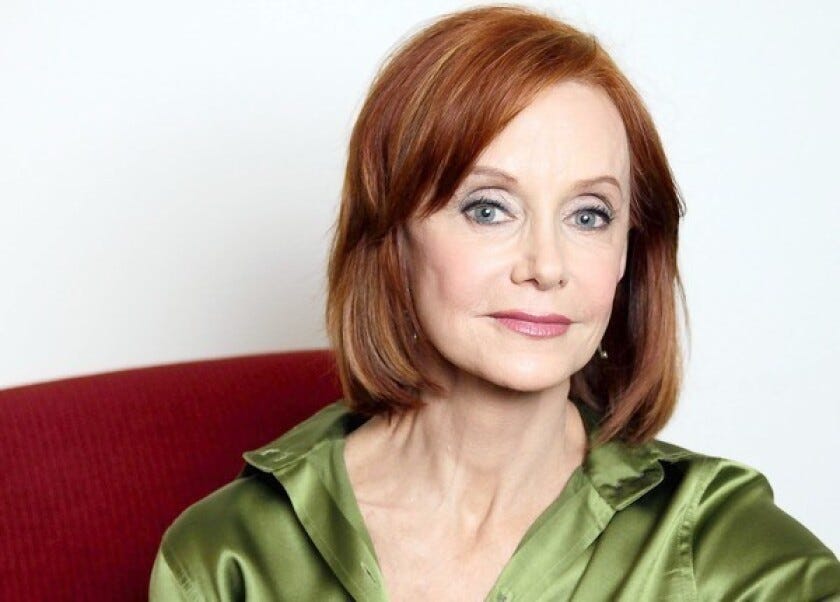
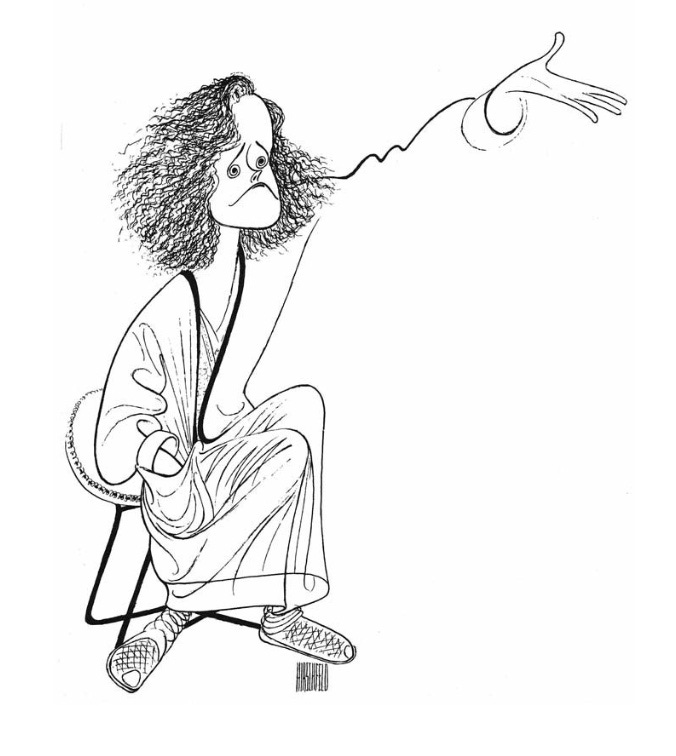

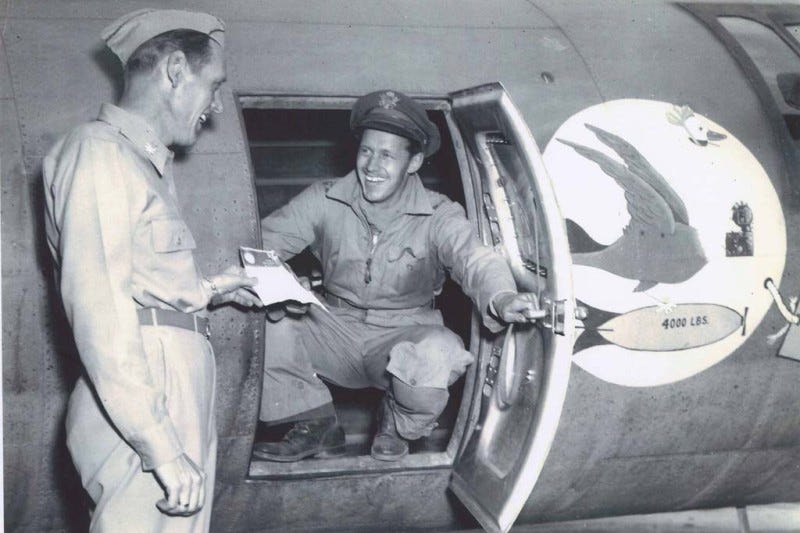
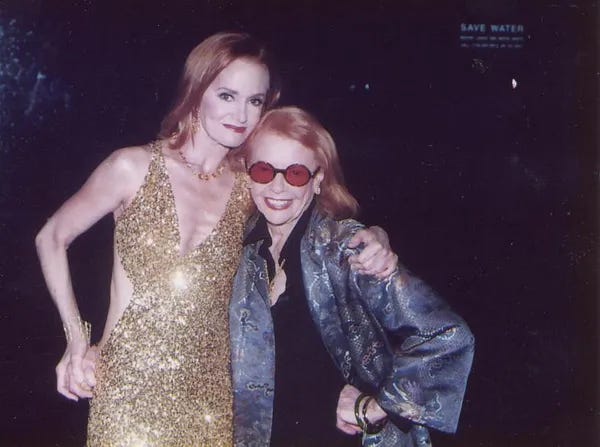
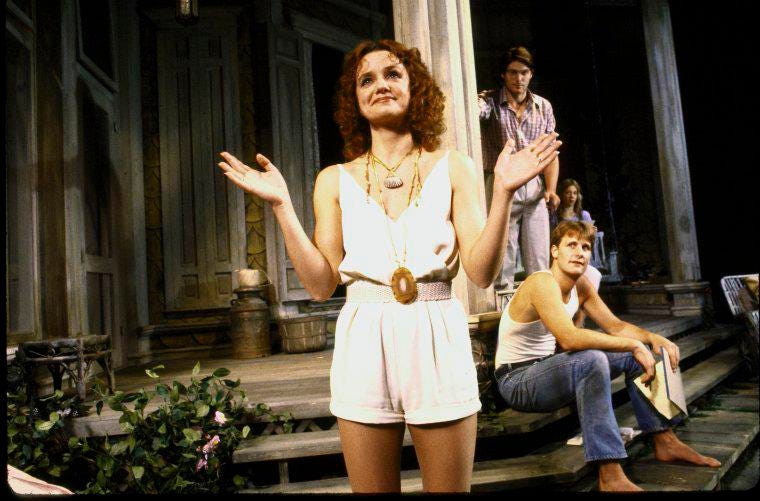
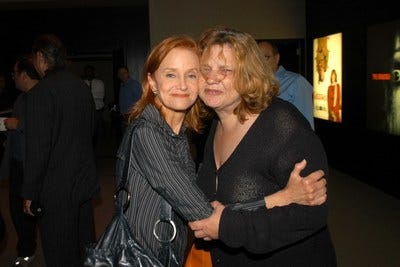
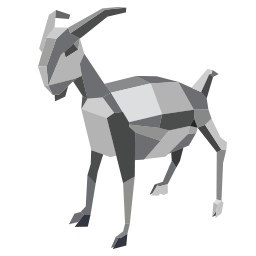
She’s always been a lovely actress but honestly I’m enjoying Call Me Kat except for Swoosie. It’s just very hard to get past that this woman is very very unhealthy in body fat and is far from healthy in appearance. I can’t help but think there has to be a million other actresses posing as a better mother type that doesn’t promote very unhealthy appearance. I can’t stop scratching my head while trying to watch on how she still is cast while in such obvious bad shape. It’s painful.
As a lapsed theatergoer who is still enthralled by actors, acting theory, and acting process, I'm so pleased to find a happy, dedicated, intelligent veteran actress as Swoosie. I certainly agree that a musical, rhythmic, or dancing feel is crucial to any dramatic performance.